Setting up a minimal git server to support Microsoft SSO using OIDC
Prerequisites
This tutorial is less about how to get a bare git server up and running on XYZ ecosystem and more about taking an existing setup and providing SSO authentication support to it for git over HTTP usage. While the tutorial will target Microsoft's SSO offerings, the concepts discussed can be re-applied to any OIDC identity provider. My recommendation is to first work with a tutorial that helps you get a basic cgit setup up and running, which you are able to clone from. After that, this tutorial should be easy to follow along.
Server
- oauth2-proxy
- Apache + cgit
- SSL certificate + key (I used Let's Encrypt to quickly acquisition one for testing)
- Access to making a Microsoft Entra ID application at portal.azure.com (or use of an alternative OIDC identity provider)
Client
git- A python install that supports msal-python
- The
msal-git-helper.pyscript in Binary-Eater/git-credential-msal
Core concepts
If the prerequistes for making this flow work seemed reasonable, lets go over some core concepts required to properly understand the authentication flow. This will be important for understanding both the capabilities and limitations of this flow as well as how to potentially apply this tutorial for OIDC providers aside from Microsoft.
OIDC vs OAuth2
If you are looking into supporting SSO flows for your git server, you probably have run into the terms OpenID Connect (OIDC) and OAuth2. Lets delve a bit into each and what they have to offer.
OAuth2
OAuth2 is an authorization protocol. What this means is that the OAuth2 flow grants a user access to resources the identity provider offers. This flow does not provide any way of validating the identity of the person using the result that grants access to the identity provider's resources. What this means is that the result cannot be used by a third party to identify that an individual is a trusted party by the identity provider. Only the identity provider can identify this.
OpenID Connect (OIDC)
OIDC is an extension to the OAuth2 protocol. OAuth2 is limited in that the result/tokens that are provided at the end of the flow cannot be used by a third party to validate that the user is indeed a trusted party by the identity platform. OIDC describes logic that enables third parties to be able to validate that a user is indeed a trusted party by the identity platform. This extension is critical for making this git flow work as illustrated by the diagrams below.
┌───────────────────────────────────────┐
│ │
│ │
OAuth2 authorization request │ │
┌──────────────────────────────────────────────────────►│ OAuth2 Identity Platform │
│ │ │
│ │ │
│ │ │
│ OAuth2 authorization response │ │
│ ┌──────────────────────────────────────────────┤ │
│ │ │ │
│ │ │ with services │
│ │ │ │
│ │ │ │
│ │ │ │
│ │ │ │
│ ▼ └───────────────────────────────────────┘
┌───────┴──────────────┐
│ │
│ │
│ │ 1st stage
│ git client │ ─────────────────────────────────────────────────────────────────────────────────────────────────────────────────
│ │ 2nd stage
│ │
│ │
└──────────┬───────────┘
│
│
│
│ ┌─────────────────────────────────────────────────────────────────────────┐
│ │ │
│ │ Git service ┌──────────────┐ │
│ │ │ │ │
│ │ │ Access │ │
│ │ │ │ │
│ │ ┌───────────────────────────────► │ denied │ │
│ │ │ │ │ │
│ │ │ │ 401 │ │
│ │ │ │ │ │
│ │ │ └──────────────┘ │
│ │ │ │
│ │ ┌───────────────────┴───┐ ┌───────────────────────┐ │
│ │ │ │ │ │ │
│ │ │ │ │ │ │
│ │ │ │ │ Apache instance │ │
│ │ │ │ │ │ │
│ Forwarding authorization resource │ │ │ │ │ │
└────────────────────────────────────────────────────┼─►│ oauth2-proxy ├───xxxxxxxxxxxxxx──►│ │ │
(Cannot be used by oauth2-proxy) │ │ │ │ │ │
│ │ │ │ serving cgit │ │
│ │ │ │ │ │
│ │ │ │ │ │
│ └───────────────────────┘ └───────────────────────┘ │
│ │
│ │
└─────────────────────────────────────────────────────────────────────────┘The diagram above illustrates the oauth2-proxy instances in-ability to
validate the identity of the git client user because the git client did an
OAuth2 flow with the Microsoft identity provider. The problem is that only the
Microsoft platform has the ability to validate the issued result and the
oauth2-proxy has no means of checking it against the Microsoft identity
provider.
Now lets take a look at the variant with OpenID Connect.
┌───────────────────────────────────────┐
│ │
│ │
OAuth2 authorization request │ │
┌──────────────────────────────────────────────────────►│ OIDC Identity Platform │
│ │ │
│ │ │
│ │ │
│ OAuth2 authorization response │ │
│ ┌──────────────────────────────────────────────┤ │
│ │ │ │
│ │ │ with services │
│ │ │ │
│ │ │ │
│ │ │ │
│ │ │ │
│ ▼ └───────────────────────────────────────┘
┌───────┴──────────────┐ ▲
│ │ │ │
│ │ ┌──────────────────┘ │
│ │ │ │ 1st stage
│ git client │ ──────────────────────────────┼─────────────────────────┼────────────────────────────────────────────────────────
│ │ │ │ 2nd stage
│ │ │ 1st stage │ 2nd stage
│ │ │ │
└──────────┬───────────┘ │ │
│ │ │
│ │ │
│ Query │ │
│ /.well-known/openid-configuration │ ┌─────────────────┼───────────────────────────────────────────────────────┐
│ for identity resource │ │ │ │
│ signature verification │ │ Git service │ ┌──────────────┐ │
│ │ │ │ │ │ │
│ │ │ │ │ Access │ │
│ │ │ │ │ │ │
│ │ │ │ ┌───────────────────────────────► │ denied │ │
│ │ │ │ │ │ │ │
│ │ │ │ │ │ 401 │ │
│ │ │ │ │ │ │ │
│ │ │ │ │ └──────────────┘ │
│ │ │ │ │
│ │ │ ┌───────────────────┴───┐ ┌───────────────────────┐ │
│ │ │ │ │ │ │ │
│ └───────┼──┤ │ │ │ │
│ │ │ │ │ Apache instance │ │
│ │ │ │ │ │ │
│ Forwarding identity resource │ │ │ │ │ │
└────────────────────────────────────────────────────┼─►│ oauth2-proxy ├───────────────────►│ │ │
(oauth2-proxy will check it against │ │ │ │ │ │
the OIDC provider) │ │ │ │ serving cgit │ │
│ │ │ │ │ │
│ │ │ │ │ │
│ └───────────────────────┘ └───────────────────────┘ │
│ │
│ │
└─────────────────────────────────────────────────────────────────────────┘We can see in this diagram that OIDC provides a mechanism for third party groups to be able to validate identity resources issued from identity providers to client applications. This enables third-party services like the git server not owned by the identity provider to be able to grant access to users authenticated against the trusted identity platform.
NOTE: although the project is called oauth2-proxy, it can handle OpenID
Connect flows.
OIDC token types
There are three core token types in the OIDC protocol.
- Access tokens
- Refresh tokens
- Id tokens
Access tokens and refresh tokens are concepts that are inherited from OAuth2. They are related to authorization. The access token grants a client application the appropriate resources owned by the identity provider. The refresh token allows the client to request a new access token without needing to go through the original dance for acquiring the first pair of tokens. There is no well defined mechanism for a third party application not owned by the identity provider to validate an access token acquisitioned by a different client application There is no well defined mechanism for a third party application not owned by the identity provider to validate an access token acquisitioned by a different client application. In the context of this article, that means our git server has no concrete way to validate the access token retrieved by the git client through the SSO dance.
Id tokens are unique to OIDC. They are designed such that a client application such as a web browser or a git client can store the token from doing an OIDC provider dance and use this token to authenticate across different applications such as various third-party web pages or git servers. These Id tokens are JWTs where the signature can be checked against the OIDC provider (part of the OpenID Connect protocol).
If you are interested in a more in-depth comparison of Id tokens vs access tokens, Auth0 has a nice blog post on this.
Reconfiguring the git server for OIDC flows with Microsoft
Now that we understand the core architecture needed to achieve an SSO flow using OIDC, lets take a look at how to configure the git server.
The first thing we will want to do is restrict our Apache instance to only be
accessible locally on the server. We do this since oauth2-proxy should be the
world facing service that redirects requests to our hidden Apache instance.
In /etc/apache2/apache2.conf, I set LimitRequestFieldSize to a fairly large
value.
# Global configuration
#
LimitRequestFieldSize 500000This value can be tuned, but basically oauth2-proxy forwards large request
headers to the Apache2 instance. I mostly wanted to focus on getting a
proof-of-concept working.
I reduce /etc/apache2/ports.conf to the following.
# If you just change the port or add more ports here, you will likely also
# have to change the VirtualHost statement in
# /etc/apache2/sites-enabled/000-default.conf
#Listen 80
#<IfModule ssl_module>
#Listen 443
#</IfModule>
#
#<IfModule mod_gnutls.c>
#Listen 443
#</IfModule>
Listen 127.0.0.1:8080
# vim: syntax=apache ts=4 sw=4 sts=4 sr noetMy configuration for cgit under /etc/apache2/sites-available/cgit.conf.
<VirtualHost 127.0.0.1:8080>
ServerName git.beater.town
DocumentRoot /var/www/htdocs/cgit
<Directory "/var/www/htdocs/cgit/">
AllowOverride None
Options +ExecCGI
Order allow,deny
Allow from all
</Directory>
Alias /cgit.css /var/www/htdocs/cgit/cgit.css
Alias /cgit.png /var/www/htdocs/cgit/cgit.png
ScriptAlias / /var/www/htdocs/cgit/cgit.cgi/
</VirtualHost>These configs might need to be tuned based on personal needs or how the instance
of cgit was installed.
Lets create a suitable Microsoft Entra ID application at portal.azure.com that
can be utilized by both git clients and the oauth2-proxy instance.
The key things to take away from the langing page are the client id and tenant id (which are public values/safe to expose). The link to the client credentials will also be useful for the next step.
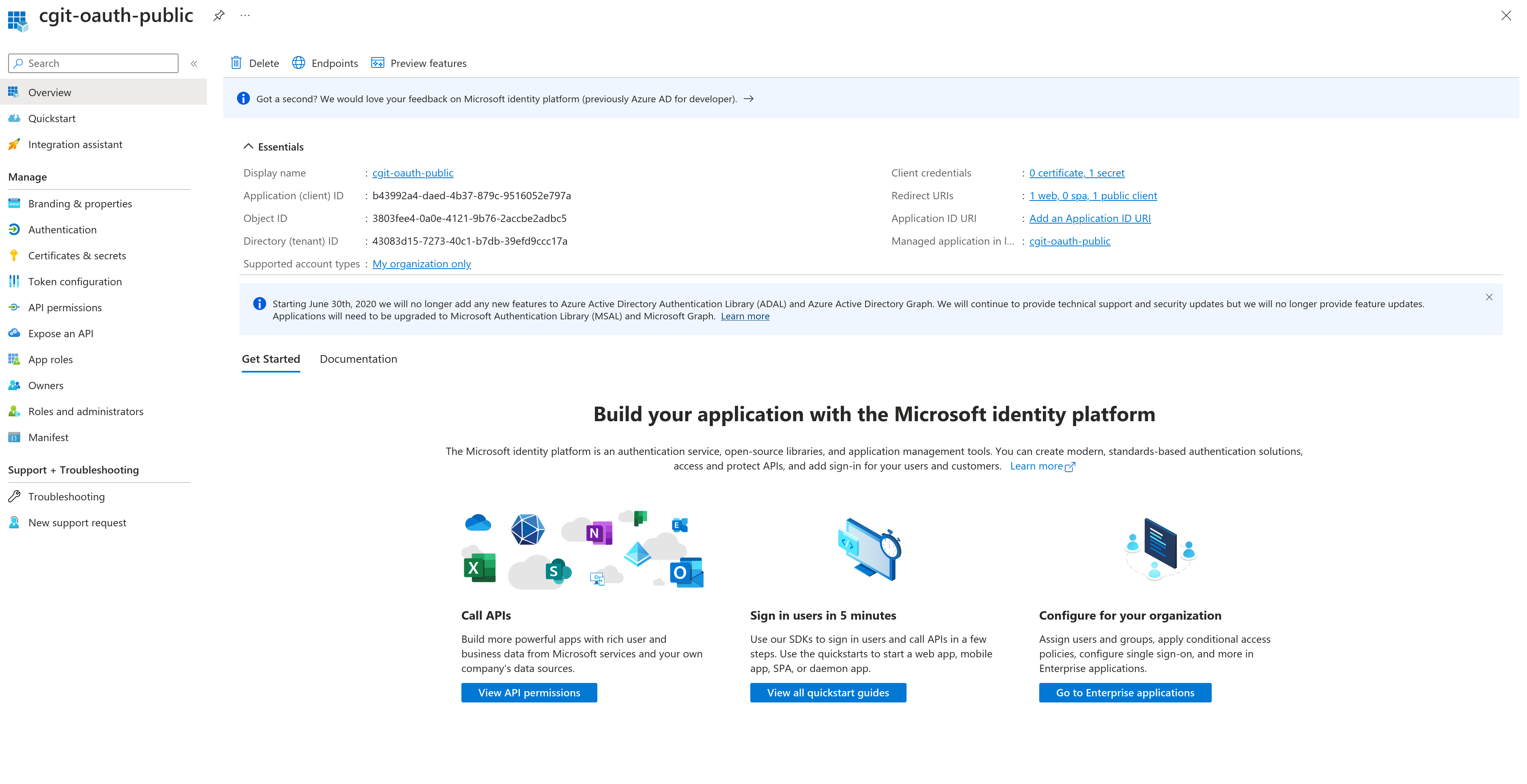
Now, we will want to create a client secret that will be consumed by
oauth2-proxy. This value cannot safely be exposed, unlike the client id or
tenant id. We will not be sharing this with git clients connect to the git
server.
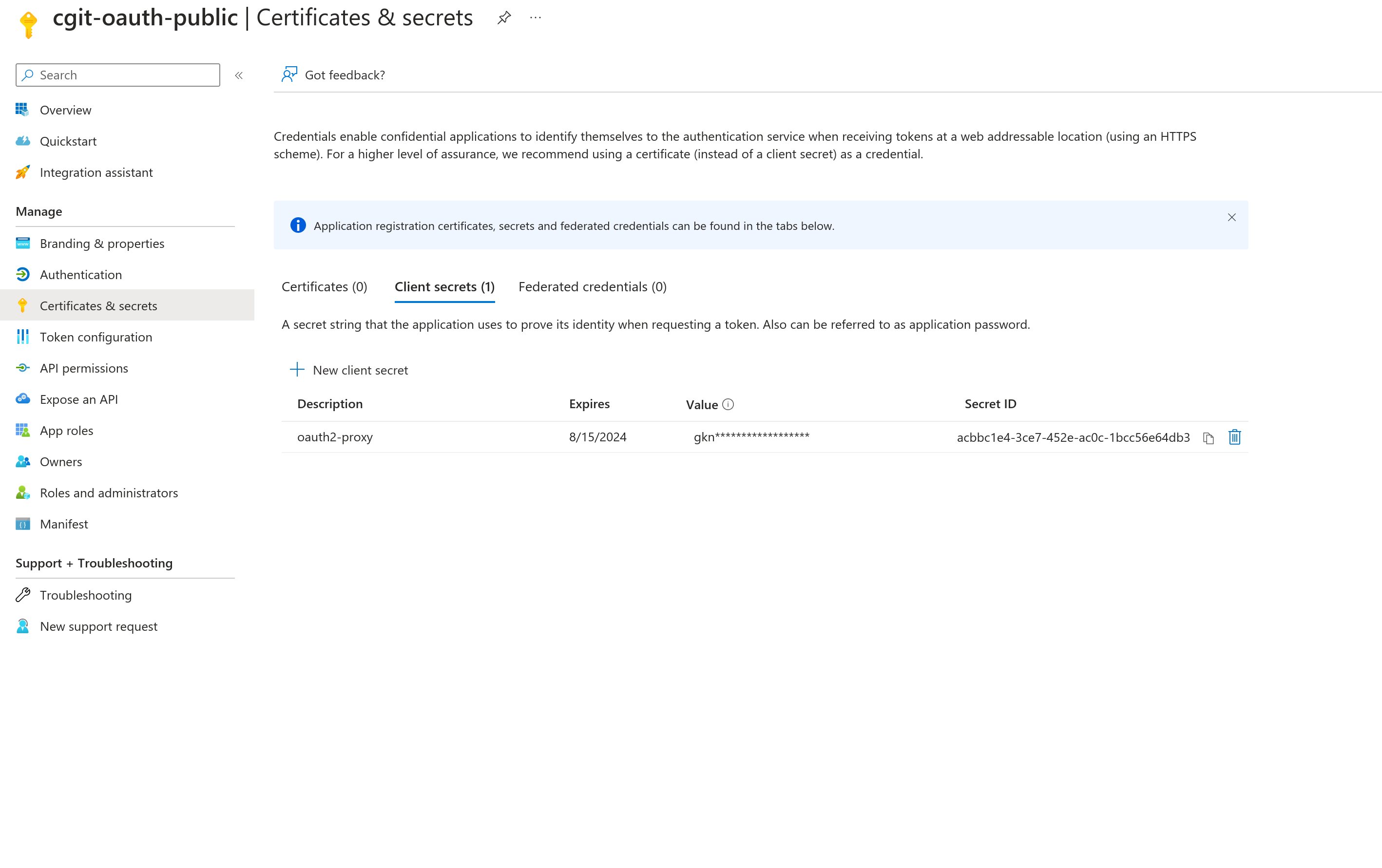
We will want to make sure we have the needed scopes for our OIDC Id token to function as expected.
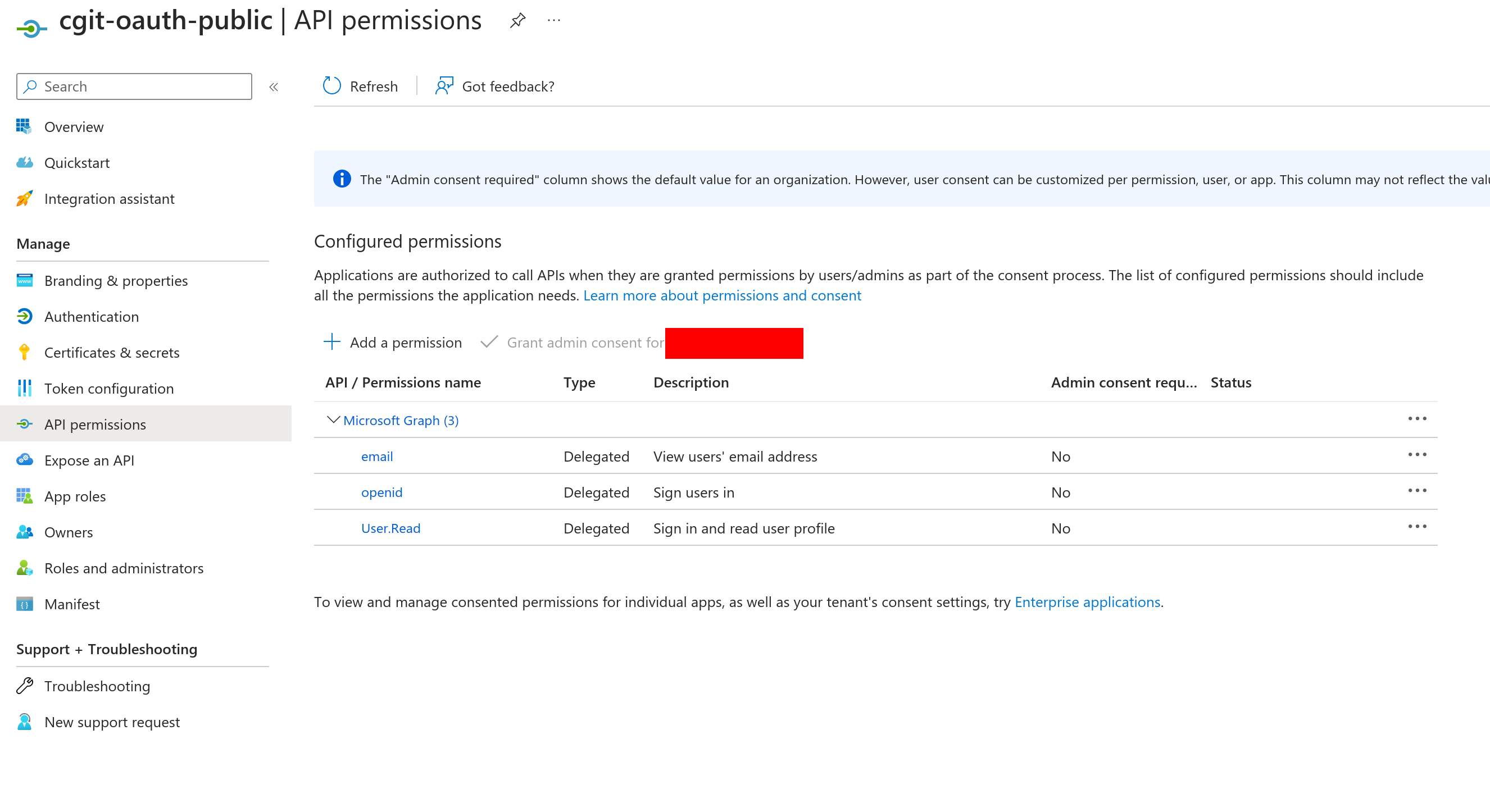
We need to configure redirect URIs for forwarding the OIDC tokens back to the
requesting application. We will need one redirect URI for oauth2-proxy and
another localhost one for git clients. The reason why exposing the client id and
tenant id is alright is due to these restrictions in the redirect URIs.
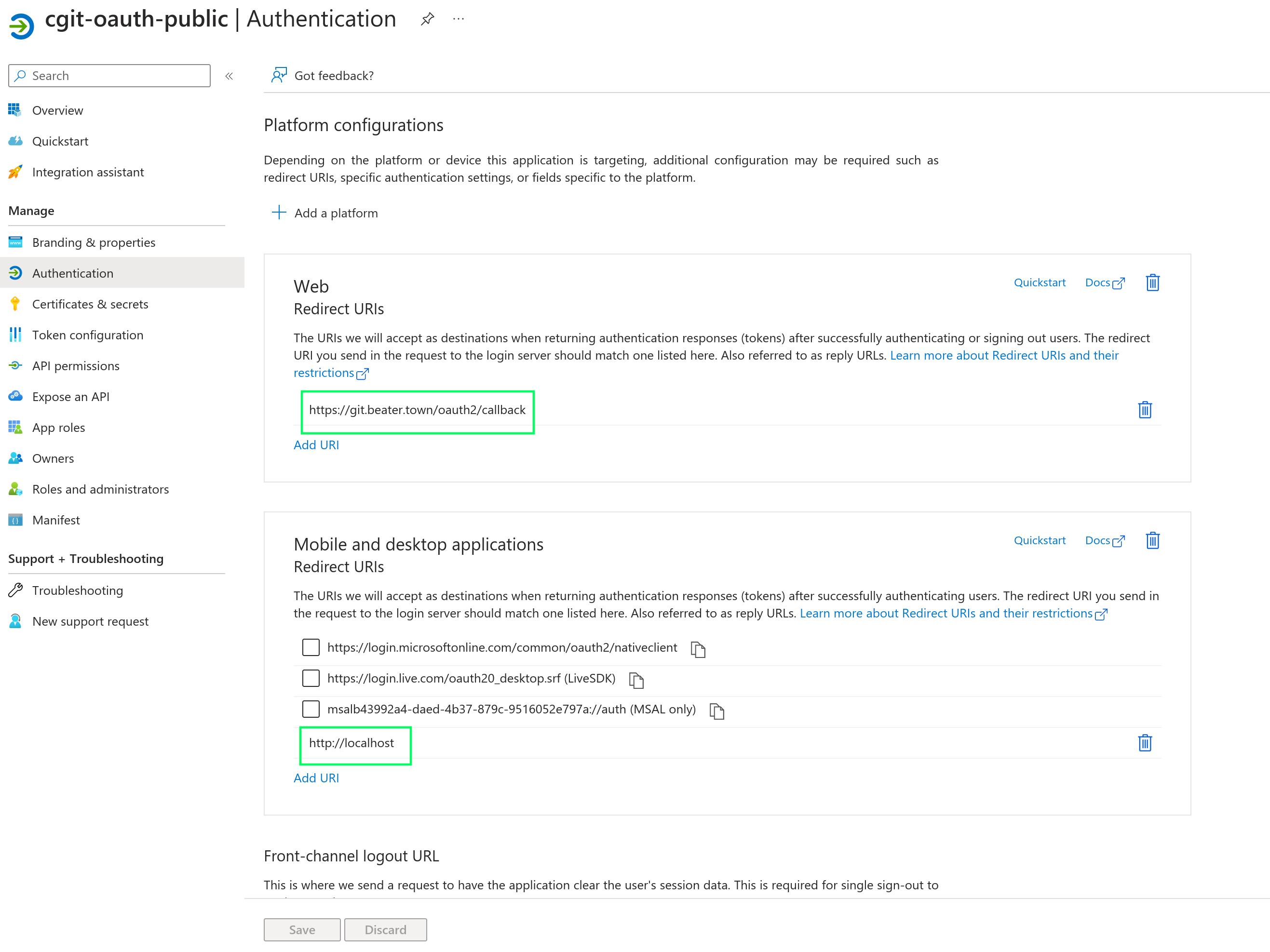
We need to make sure various authentication flows will indeed generate an OIDC
Id token. We also need the Entra Id application to support public client flows,
so git users do not need a client secret to engage the OIDC flow.
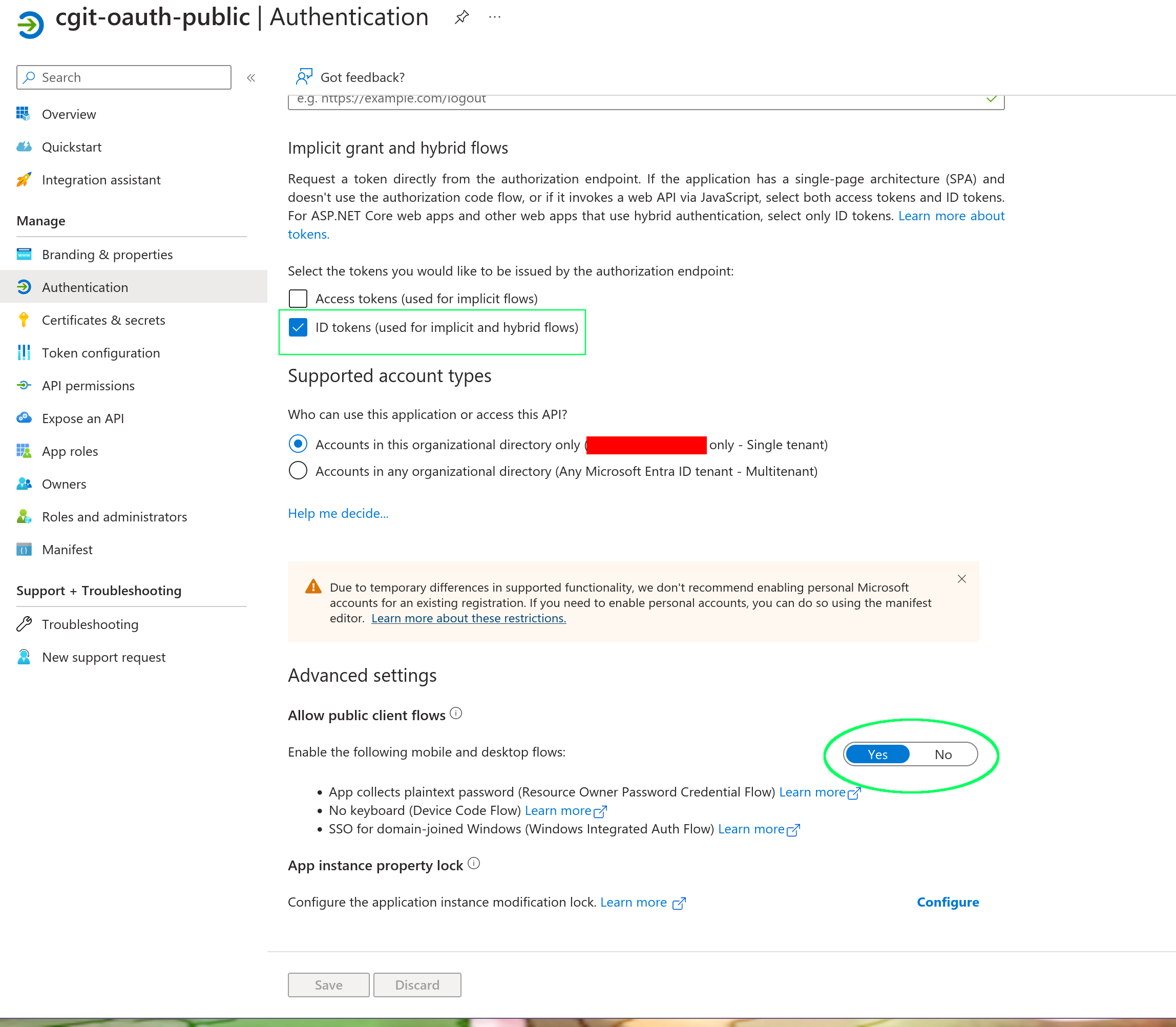
Theoretically, this next change should not be needed, but I do it just to be
certain that future change in Microsoft services does not randomly take down my
git service's HTTP authentication. I change "accessTokenAcceptedVersion": null
to "accessTokenAcceptedVersion": 2. Does has to do with controlling the format
and issuer source of the OIDC Id token from Microsoft Entra ID services. Version
2 is the latest and should be issued by default. However, I want to guarantee
this and not let a v3 rollout break my application, so I enforce the version in
the manifest.
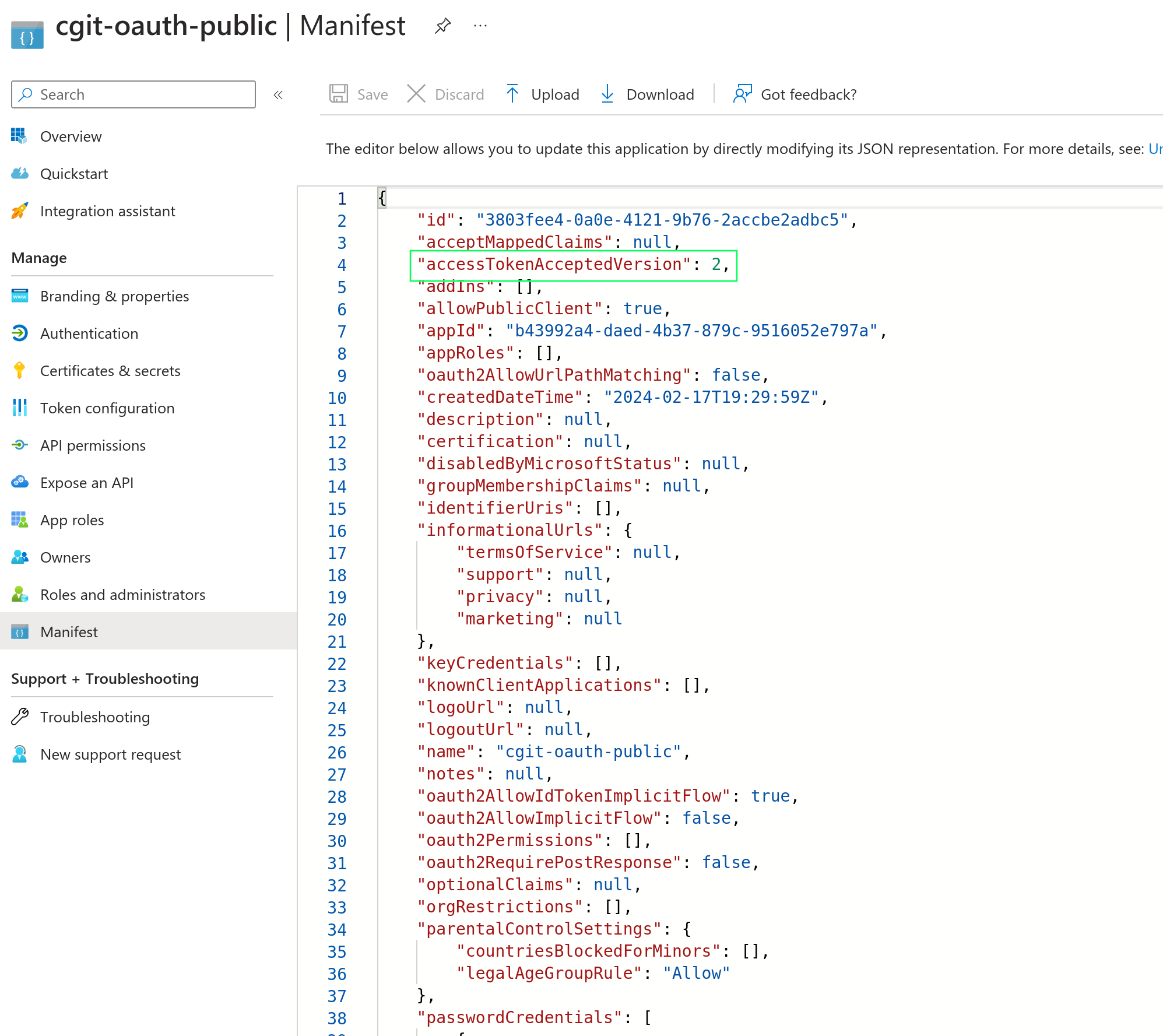
Next, we will get oauth2-proxy running with the needed configuration flow.
This part is fairly easy thanks to the great work done by the project
contributors.
## OAuth2 Proxy Config File
## https://github.com/oauth2-proxy/oauth2-proxy
## <addr>:<port> to listen on for HTTP/HTTPS clients
# http_address = "127.0.0.1:4180"
https_address = ":443"
force_https = true
## Are we running behind a reverse proxy? Will not accept headers like X-Real-Ip unless this is set.
# reverse_proxy = true
## TLS Settings
tls_cert_file = "/path/to/fullchain.pem"
tls_key_file = "/path/to/privkey.pem"
## the OAuth Redirect URL.
# defaults to the "https://" + requested host header + "/oauth2/callback"
redirect_url = "https://git.beater.town/oauth2/callback"
## the http url(s) of the upstream endpoint. If multiple, routing is based on path
upstreams = [
"http://127.0.0.1:8080/"
]
## only using a single provider
skip_provider_button = true
## Logging configuration
#logging_filename = ""
#logging_max_size = 100
#logging_max_age = 7
#logging_local_time = true
#logging_compress = false
#standard_logging = true
#standard_logging_format = "[{{.Timestamp}}] [{{.File}}] {{.Message}}"
#request_logging = true
#request_logging_format = "{{.Client}} - {{.Username}} [{{.Timestamp}}] {{.Host}} {{.RequestMethod}} {{.Upstream}} {{.RequestURI}} {{.Protocol}} {{.UserAgent}} {{.StatusCode}} {{.ResponseSize}} {{.RequestDuration}}"
#auth_logging = true
#auth_logging_format = "{{.Client}} - {{.Username}} [{{.Timestamp}}] [{{.Status}}] {{.Message}}"
## pass HTTP Basic Auth, X-Forwarded-User and X-Forwarded-Email information to upstream
# pass_basic_auth = true
pass_user_headers = true
## pass the request Host Header to upstream
## when disabled the upstream Host is used as the Host Header
# pass_host_header = true
## Email Domains to allow authentication for (this authorizes any email on this domain)
## for more granular authorization use `authenticated_emails_file`
## To authorize any email addresses use "*"
email_domains = [
"*"
]
## The OAuth Client ID, Secret
# client_id = "123456.apps.googleusercontent.com"
# client_secret = ""
## Pass OAuth Access token to upstream via "X-Forwarded-Access-Token"
# pass_access_token = false
## Authenticated Email Addresses File (one email per line)
# authenticated_emails_file = ""
## Htpasswd File (optional)
## Additionally authenticate against a htpasswd file. Entries must be created with "htpasswd -B" for bcrypt encryption
## enabling exposes a username/login signin form
# htpasswd_file = ""
## bypass authentication for requests that match the method & path. Format: method=path_regex OR path_regex alone for all methods
# skip_auth_routes = [
# "GET=^/probe",
# "^/metrics"
# ]
## mark paths as API routes to get HTTP Status code 401 instead of redirect to login page
api_routes = [
".*/.*\\.git.*"
]
## Templates
## optional directory with custom sign_in.html and error.html
# custom_templates_dir = ""
## skip SSL checking for HTTPS requests
# ssl_insecure_skip_verify = false
## Cookie Settings
## Name - the cookie name
## Secret - the seed string for secure cookies; should be 16, 24, or 32 bytes
## for use with an AES cipher when cookie_refresh or pass_access_token
## is set
## Domain - (optional) cookie domain to force cookies to (ie: .yourcompany.com)
## Expire - (duration) expire timeframe for cookie
## Refresh - (duration) refresh the cookie when duration has elapsed after cookie was initially set.
## Should be less than cookie_expire; set to 0 to disable.
## On refresh, OAuth token is re-validated.
## (ie: 1h means tokens are refreshed on request 1hr+ after it was set)
## Secure - secure cookies are only sent by the browser of a HTTPS connection (recommended)
## HttpOnly - httponly cookies are not readable by javascript (recommended)
cookie_name = "_oauth2_proxy"
cookie_secret = "<redacted secret. Look at oauth2-proxy docs on how to generate/handle>"
# cookie_domains = ""
# cookie_expire = "168h"
# cookie_refresh = ""
cookie_secure = true
# cookie_httponly = true
## Microsoft Identity Platform OIDC Settings
provider = "oidc"
oidc_issuer_url = "https://login.microsoftonline.com/43083d15-7273-40c1-b7db-39efd9ccc17a/v2.0"
login_url = "https://login.microsoftonline.com/43083d15-7273-40c1-b7db-39efd9ccc17a/oauth2/v2.0/authorize"
redeem_url = "https://login.microsoftonline.com/43083d15-7273-40c1-b7db-39efd9ccc17a/oauth2/v2.0/token"
user_id_claim = "email"
oidc_email_claim = "sub"
scope = "openid"
client_id = "b43992a4-daed-4b37-879c-9516052e797a"
client_secret = "<redacted secret>"
skip_jwt_bearer_tokens = trueThe invocation for this simply becomes oauth2-proxy --config
/path/to/oauth2-proxy.cfg. In my case, I store the file under /etc, but I am
sure there are better choices.
We can further use options like pass_user_headers to do authorization checks
behind the oauth2-proxy instance, limiting the valid users permitted to use
the git server to a limited group.
Setting up the git client to authenticate against the server using SSO
Unfortunately, git today does not let credential helper programs inject HTTP
headers. In this instance, we need to inject an Authorization header with the
OIDC Id token for authentication to work. git today does have a configuration
for extra HTTP headers. We can take advantage of that to make this
authentication scheme work.
We will utilize the msal-git-helper.py script in
Binary-Eater/git-credential-msal to accomplish this since the flow for
programmatically extracting an OIDC Id token from the Microsoft authentication
flow is not well documented (while the access token and refresh token are
cleanly presented in their APIs).
The invocation looks like the following.
git -c http.extraHeader="Authorization: Bearer $(python3 /path/to/msal-git-helper.py <client_id> <tenant_id>)" clone <repository_http_url>For the instance I have set up, my invocation looks like the following.
git -c http.extraHeader="Authorization: Bearer $(python3 /path/to/msal-git-helper.py b43992a4-daed-4b37-879c-9516052e797a 43083d15-7273-40c1-b7db-39efd9ccc17a)" clone https://git.beater.town/my-project.gitAfterword
Overall, we take the same OIDC scheme used to make browser authentication flows
work across different web applications. The git client user is analogous to
the browser and the configured git servers are analogous to the web
applications.
You may have noticed I named the repository git-credential-msal even though
the program contained in this repository is not a git-credential-helper program.
My next steps will be posting patches for git to properly support accepting
HTTP headers for credential helper programs. Once accepted, I can make a proper
credential helper for this flow.